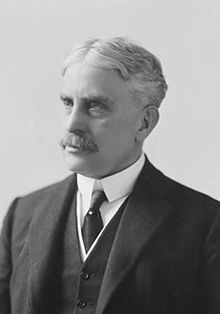Get Today in Masonic History into your Inbox. Sign up today for one of our email lists!
Need an article for your Trestleboard/Newsletter see our Use Policy
Robert Laird Borden is Born

Today in Masonic History Robert Laird Borden is born in 1854.
Robert Laird Borden is a Canadian politician.
Borden was born in Grand-Pré, Nova Scotia on June 26th, 1854. Borden worked on the farm owned by his parents.
From 1868 to 1874, Borden worked as a teacher in Grand-Pré and in New Jersey. He returned to Nova Scotia where he worked at a Halifax Law Firm for four years. In August of 1878 he was called to the bar of Nova Scotia, despite having no formal education. He placed first in his bar examinations.
From 1880, Borden practiced law in two firms. In the second he became a partner and eventually the senior partner in the firm. He also sat on the board of directors of various Nova Scotia businesses including the Bank of Nova Scotia.
In 1896, Borden was elected to Parliament as a Conservative Just five years before Borden had been a Liberal. He had split with the Liberals over Reciprocity, the idea free trade should take place with the United States in regards to all natural resources. Borden was firmly against the idea.
In 1911, in the Federal election the Conservatives came to power and Borden became Prime Minister. Borden became the last Prime Minister born before confederation and the last Canadian Prime Minister to be knighted. He led Canada through World War I. Borden promised half a million soldiers for the war, although he had difficulty recruiting new soldiers when Canadians started to realized the war was not going to end quickly.
In 1916, as Prime Minister Borden saw the National Research Council of Canada created. The NRC is the primary scientific research and development agency of the Canadian government.
In 1917, Borden was re-elected as Prime Minister. During the campaign he had promised equal suffrage for women. In 1918 he introduced a bill doing accomplishing it. It passed easily.
At the Paris Peace Conference at the end of World War I, Borden demanded a separate seat from the British representative. This was initially opposed by both Britain and the United States, the United States feeling it gave a second vote at the table to Britain. Borden argued Canada had lost greater numbers in the war than the United States. Eventually the British Prime Minister at the time relented and convinced the United States, Canada, along with the other British Commonwealths be allowed their own seat at the table.
Borden retired from politics in 1920. He became the Chancellor of Queen's University and McGill University. Although his term as Chancellor of McGill came during the last two years of his term as Prime Minister.
Borden passed away on June 10th, 1937.
Borden was initiated into St. Andrews Lodge No. 1 in Kentville, Nova Scotia in 1880.
This article provided by Brother Eric C. Steele.

